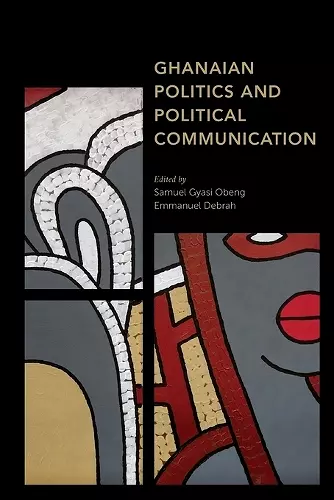Ghanaian Politics and Political Communication
Samuel Gyasi Obeng editor Emmanuel Debrah editor
Format:Paperback
Publisher:Bloomsbury Publishing PLC
Published:13th Apr '23
Currently unavailable, and unfortunately no date known when it will be back
This paperback is available in another edition too:
- Hardback£113.00was £113.00(9781786613691)

Working from multidisciplinary and interdisciplinary perspectives (especially, from the social sciences, media studies discourse analysis, text grammar, folklore, performing arts and linguistics), the authors of the volume investigate and illuminate pertinent issues on democratization, elections and electioneering campaigns and the constitution of order in an African context.
The strategies through which political actors and the media speak about important policy issues such as healthcare, infrastructure, education, and finance during presidential sessional addresses and political campaigning are also elucidated. The extent of political ecologies’ impact on general elections, on policy issues, and on split-ticket voting (especially what causes it to happen and its impact on who gets elected and the consequent impact on party unity or disintegration) are also given scholarly attention. Also elucidated are is the entwinning of language, power, liberty, ideology and representation and issues deemed politically nerve wrecking and capable of entrapping political actors and causing the citizenry to either lose confidence in them or even call for their resignation.
For nearly 30 years, control over Ghanaian politics has alternated more or less regularly between the New Patriotic Party and the National Democratic Congress. This contrasts with the country’s prior history as an independent country. (Earlier Ghana experienced numerous military coups and a few years of single-party rule between 1957 and the establishment of the Fourth Republic in 1993.) The 18 contributors to this valuable book provide detailed discussions of Ghana's transition to democracy. Essays reveal that voters are influenced more by socioeconomic factors than by ethnicity or religion, and that education plays an important role. Though party leaders speak in the former colonial language and their platforms are published primarily in English, political communication at the popular level occurs in vernaculars. Who are the most significant interlocutors? The answer to that question varies widely, and it depends on the audience being addressed. Numerous tables, occasional statistical analyses, detailed chapter-by-chapter end notes, quotations from parliamentary debates, and side-by-side English translations of party tracts add to the scholarly value of this collection.
Summing Up: Recommended. Upper-division undergraduates through faculty.
Deploying their uncommon understanding of politics and society, the various contributors to this volume educate the reader on the multifaceted themes that have shaped Ghana’s political trajectories since the era of decolonization. In both the normative and paradigmatic contexts, the book successfully demonstrates that indeed, democracy is a lake; it acquires its particular character from the ecosystem. This is a must-read for all students of African politics. -- Raphael Chijioke Njoku, Professor of African History and Chair of Global Studies and Languages, Idaho State University
The editors and authors of this collection have first-hand experience with Ghanaian politics, campaigns and other political and social activities, meaning they are able to take the reader inside Ghana, revealing intimate details of the country’s unique electioneering campaigns. Even the expert will learn tremendously from the great insights the authors draw from political science, linguistics, ethnomusicology, political socialization, policy-making and legislative practices to show how politics is now conducted in Ghana. This book is highly recommended to all readers interested in Ghana's unique style of political campaigns. -- Kwamina Panford, Senior Fulbright Scholar and Carnegie Africa Diaspora Fellow, Northeastern University
Ghanaian Politics and Political Communication is a unique contribution to understanding the importance of language use in the context of democracy and political communication in Ghana. All contributors to this well-researched book are Ghanaian scholars in fields of political science, linguistics, communication studies, and musicology. The data includes detailed responses to field interviews, questionnaires, presidential speeches to parliament and the nation, as well as analysis of lyrics of music that are assessed to be political.
It is observed that for Ghana’s democracy to be strengthened and sustained, there is the need for its citizens to be properly informed on issues that are pertinent to their lives. It is further noted that even if the media has access to information, still the use of the English language as the dominant mode of elite communication to the public does not guarantee an informed electorate. Yet, Ghana’s record of the Fourth Republic, where incumbency has not necessarily resulted in election victories for the party in power, is indicative that the electorate is rational in its decisions and would be even more so if political actors communicated in the appropriate languages and modes to reach all. A distinguishing characteristic of this project is the application of theories and concepts in political literature to frame the analysis.
The thought-provoking, engaging and well-written chapters of this book provide deep insights into political communication within a democratic context set upon time-tested African traditional communication practices. The blend of authors comprising experienced and newer academics and practitioners in the areas of politics, linguistics, communication, music and international relations, offers a wealth of experience and innovation for readers to learn from. A must-read for every student of African/Ghanaian politics and communication. -- Nana Aba Appiah Amfo, Department of Linguistics, University of G
ISBN: 9781538158838
Dimensions: 223mm x 154mm x 23mm
Weight: 467g
312 pages